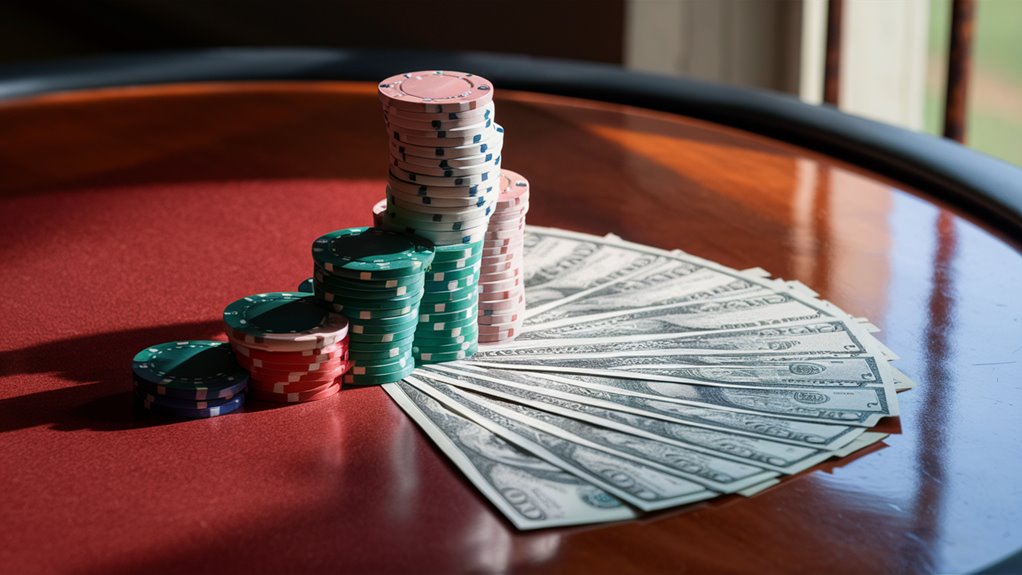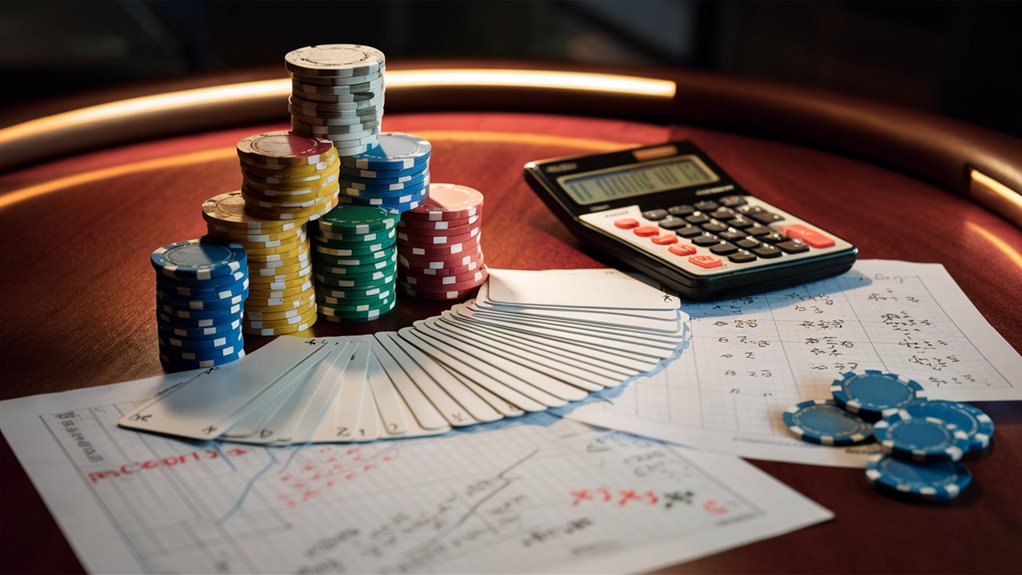Key Poker Tips for Winning Most Games

To win at poker often, you need more than just luck. Even though it might look like just a game of cards, true wins need smart plans, knowing the minds of others, and clear math steps.
Basic Rules
Knowing hands and where you sit are important, but just the start. What sets fun players apart from pros are three main points:
- Watching and knowing habits of foes
- Money handling and looking at risks
- Quick thinking when stressed
Better Play Plans
Good poker players get good at pot chances, guessing odds, and using their seat well. These math ideas blend with mind games like noticing hints and acting as per the table mood to win more.
Mind Strength
Strong thinking is key for long wins. Top players keep:
- Feelings in check when losing
- Sharp focus all game
- Smart plans as per others
- Sure bets in a pattern
Money Handling
Using good money plans saves your cash and helps you:
- Play steady at the right levels
- Keep risks low when odds change
- Grow your poker cash slowly
- Pick games wisely
By knowing these basic and deeper ideas, players go from just hoping to win to making cash at the poker table. 먹튀검증커뮤니티
Know Your Hand Values
Top Guide to Poker Hand Values: Know the Basics
Get the Poker Hand Ranks for Better Plays
Knowing poker hand ranks is a must for winning plans.
From single high cards to the best set, fast knowing the hand values lets players make quick, smart choices.
This deep knowledge helps you think of odds and place strength as you play.
Main Hand Ranks
The whole range of poker hands, low to high:
- High Card
- One Pair
- Two Pair
- Three of a Kind
- Straight
- Flush
- Full House
- Four of a Kind
- Straight Flush
- Royal Flush
Using Ranks in Games
Knowing hand ranks well changes how you see the game and guess what others have.
If you really get the hand ranks, you can see possible draws, think about pot chances, and bet better.
This is super key in Texas Hold’em, where shared cards make complex sets and many drawing chances.
Better Choices
Smart players use their hand rank know-how to:
- Check hand power fast
- See draw chances
- Think of win chances
- Bet right
- Know foe hand sets
Getting the power of hands in different game times lets players get more value and cut losses in different game times. The Psychology Behind
Handle Your Poker Money
Poker Money Plans: The Top Guide
Key Money Rules
Smart money rules are key between long wins and bad losses.
Sticking to set money limits, no matter your mood, lays a base for staying in profit.
Pros use this rule: never put more than 5% of all your money in one game.
Picking the Right Levels
Choosing what level to play needs you to think about your total money.
Keep at least 20 buy-ins for normal games and 50 buy-ins for big games to stay safe from bad runs.
For example, in a $1/$2 game with $200 to play with, you need at least $4,000 total to keep safe from big losses.
Watch and Learn From Games
Tracking games well is a must to use your money best. Write down:
- Wins and losses
- How long you play
- Game feel
- Smart moves
This full info helps you find game mistakes and change your plan.
When you lose a lot, play with less money. Only move up after doing well.
Keep Your Money Safe
Keep your poker cash away from everyday money. Casino Tourism: Attracting Tourists
Have a special poker fund and never touch cash needed for daily life.
Keep a big safety cash to handle bad times and keep playing your best without worry.
Watch How Players Act
Know Poker Player Acts: A Full Guide

Body Signs and Moves
Body signs tell a lot about player thoughts at the table. Look for key moves like how they handle their hands, change how they sit, and how they breathe.
Players who stay still or act odd often hold good hands. Nervous chip moves or odd betting might mean they are not sure or trying to trick you.
Betting Time and Patterns
Watching timing tells a lot about hand strength. Fast bets often mean good hands, while slow moves can show weakness or careful plans.
Watch how they arrange their chips – neat, even piles often mean careful players, while messy piles might mean emotional plays.
Talking and Group Signs
How they talk tells much about thinking. Watch how they change from talking to quiet, as these changes often hide hand strength.
Keep track of how players react to different game parts and bet sizes across many hands to know their usual ways and spot changes. The Economic Impact of the
Smart Tell Uses
Build a smart tell plan by mixing many behavior signs. Look for patterns that back up your first thoughts.
Note that smart players might use fake tells, so double-check over many hands. Start by watching a few players closely before looking at all at the table.
Seat Power at the Table
Seat Power at the Table: A Full Plan Guide
Know Seat Power in Poker
Where you sit is a big tool in poker play, shaping how you pick and act.
Playing from near the end (close to the dealer) lets you watch others first, helping you make better bet, call, or fold choices.
Early vs. Late Seats
Early seats, like the small blind or first to play, mean you go first with little info. Winning from these spots needs top starting hands and spot-on play.
On the other hand, late seats let you play more hands as you can see others’ strength and use their weak plays to steal pots.
Use Seat Power Well
Main Plan Points:
- Keep hand choices tight in early seats
- Open up hand choices as your seat gets better
- Steal blinds often from late spots
- Use your spot to control pot size
Seat power stays useful from game start to end, keeping its effect through all rounds. This lasting edge makes using your seat well one of the best ways to make money in poker when used right.
When To Keep or Drop Cards
When To Keep or Drop: Know Poker Hand Choices
Key Choices in Poker
Checking hand strength is key to poker wins.
Every player must get good at seeing hand power and picking to keep going or stop.
Wins rely on thinking about many points including how good the hand started, where you sit, and how deep your stack is.
Top Start Hands and Seat Play
Great hands like big pairs (tens or higher) and suited high cards (AK, AQ) need real thought to keep playing.
Knowing pot chance math – the tie between possible wins and cost to play – proves math right for moving forward with strong hands.
Where you sit changes how you can play hands, with late spots giving more room to play.
When to Let Go of Your Cards
Smart folding separates those who often win from those who don’t.
Drop unsure hands when facing strong early bets, especially from first spots.
Low pairs and cards that don’t match are not often good to keep when many play or if bets are high.
The rule “when not sure, drop out” saves your chips from unsure spots.
Best Hand Choices
Money-making poker is about picking few but strong moments over playing often.
The best players use only 20% of their starting hands and fold the other 80%.
This careful picking helps make more by using chips mainly in the best spots.
Further Thoughts
Beyond just strong hands, think about how others play, stack to pot ratios, and what part of the game it is when picking to keep or drop cards.
How the game feels and earlier moves give key hints for picking hands.
Keep these points in mind to make smart hold or fold picks.
Know Betting Moves
Knowing Poker Betting Moves: A Plan Guide
Basic Betting Moves
Betting moves are key to deep poker plans.
Winning players watch how foes bet in many cases to find weak spots.
By looking at how much they bet, timing hints, and how often they bet, you build a clear view of how they play.
Reading Game Boards and Seat Moves
Board reading opens your eyes to how others tend to play. Some show the same betting size when they have strong cards.
- Seat-based moves come out in different spots
- Quick tells show in timing and bet sizes when they bluff
Stack Sizes and Game Parts
Game-specific moves show as stacks and game parts change:
- Short stacks play more bold
- Risk taking shows in bubble play
- Continuation betting changes with stack to pot rates
Using Found Moves
Use what you know to win more:
- Catch bold players with strong cards
- Go after those who often fold with well-timed bluffs
- Change bet sizes to use known answers
- Play as per stack-led tips
Deeper Move Reading
Build a way to check:
- Bet sizes across different game parts
- Aggression levels by seat
- Raise patterns in key times
- Catch bluffs through odd timing and sizes
This deep betting know-how turns into strong game edges at the poker table.


